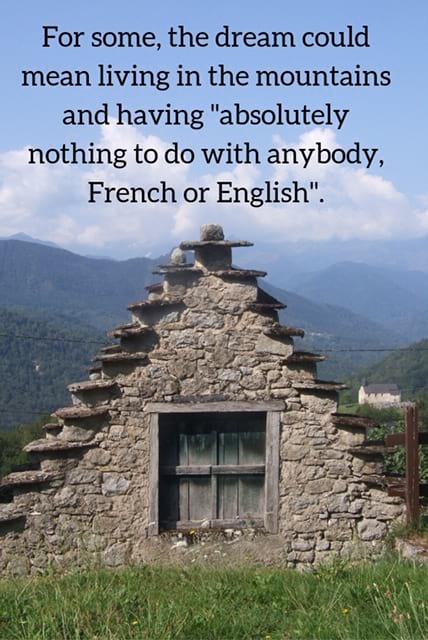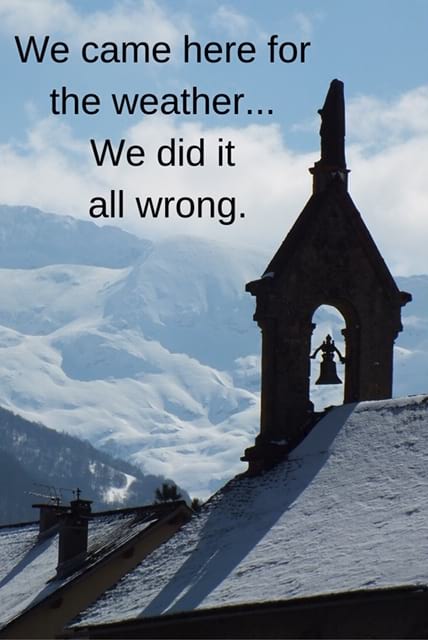Studying the British Dream
by Michelle Lawson

The French Dream
A few years ago, after buying a holiday home in France, I became fascinated by that very British ‘dream’ to escape the UK and move to France. At the time I was looking to start a PhD study, and what better topic than something like this, that would undoubtedly interest a wide audience?
And so, with approval from Lancaster University, I decided to delve beneath the romantic accounts and make a study, which has just been published as a travel narrative.
My interviews were carried out within the Ariège département of Occitanie, although the themes resonated across British migration in France as a whole.
Hitting the headlines
 For example, I analysed dozens of British press articles that referred to the British in France, and I was surprised at the level of negativity expressed by the writers, who were often living in France themselves.
For example, I analysed dozens of British press articles that referred to the British in France, and I was surprised at the level of negativity expressed by the writers, who were often living in France themselves.
We’re accustomed to seeing Britain’s own immigration situation described in the tabloids using language such as ‘threatened’, ‘invasion’ and ‘swamped’, but the incomers themselves were using it to draw a demarcation between their own behaviour and that of all the other Brits in France.
Writers used words like ‘ghetto’ and ‘invasion’, and I read of attitudes such as ‘I didn’t come to France to hang out with other Brits’.
Expats, bangers and mash
I read about the apparently limited adventurous spirit of the Brits in France who listen to the BBC, make sausages and mash and drink too much wine. 
All of which seems quite natural, as it’s what migrants or ‘expats’ often do – it’s what they’ve always grown up with; what feels comfortable.
Some writers had drawn distinctions between the established residents who knew France, and the recent ‘flood’ of people who came because they’d seen it on television.
I recently visited the France Show in Olympia and I was pleased to see English-speaking services to help prospective buyers in towns like Beziers and Montpellier, so that the buyer can learn about the area, not just the price of the house.
This might sound obvious, but I’d met a few incomers who hadn’t been at all familiar with the village, the département, or even France, before they sold up and moved there. It was sometimes the case that an estate agent had called them to say that there was a house available that ticked all of their boxes – and it hadn’t mattered that it was somewhere they’d never heard of.
When in Rome…
Stereotyping is an over-generalisation, but it’s still unwelcome. I found many people were keen to avoid coming across as members of a visible British community. People talked a lot about doing things the ‘right way’ here in France, anxious to avoid being aligned with those ‘others’ who didn’t.
They repeated the characteristics that are said to typify the Brits in France: the hankering after English foods and the reliance on each other. Despite this, many of the interviewees knew each other, socialised together and enjoyed ‘home from home’ treats from the few British shops and cafes in the region.
You only have to look at the widespread role of online forums, both France-wide and regional, to see the importance attached to having access to one’s own compatriots.
The more I listened, the more I understood the conflict between what people said they believed, and what they told me they did. We try to understand our place here in France, and if people’s stories sounded contradictory, then I saw that as a symptom of living under the shadow of a stereotype.

The lingo
Have you noticed how ‘the language issue’ is rarely mentioned in any depth in the property programmes on TV? There’s sometimes an assumption that incomers will arrive with little French and can pick it up as they go along.
What surprised me was that those who were really quite fluent were often the most dissatisfied with their level, saying that being ‘good’ was never going to be enough. On the other hand, others managed with just ‘getting by’, and were perfectly happy with that.
Being welcomed at French social gatherings was more important to them than being fluent, and some even took delight in being treated as something different, the English.
Like any dream, this one is vulnerable: to the economy, to exchange rates, to illness, to family needs and, of course, to political uncertainty. The final chapter, Not a bargaining chip, brings the book up to date within the context of Brexit.
Michelle Lawson’s travel narrative, A House at the End of the Track, is available on Amazon.
You can also follow her via her blog: www.michelle-lawson.com
Paperback
Kindle

